Australian democracy faces a crisis of representation. People feel alienated from our politics and our institutions. Donkey votes are up, minor parties’ votes are up, and the major parties are riven by internal dissent. In a way, even the proposed Indigenous Voice to Parliament can be seen as an attempted end-run around the dysfunction of our electoral process. In short, no-one seems to think that our Federal Parliament can do its job of representing the Australian people’s diverse interests.
One intriguing, and perhaps counterintuitive, response to this problem was floated recently in the Parliament’s Joint Standing Committee on Electoral Matters report into the 2019 election.
Already a subscriber? Log in
Subscribe for just $2 a week
Try a month of The Spectator Australia absolutely free and without commitment. Not only that but – if you choose to continue – you’ll pay just $2 a week for your first year.
- Unlimited access to spectator.com.au and app
- The weekly edition on the Spectator Australia app
- Spectator podcasts and newsletters
- Full access to spectator.co.uk


























Comments
Don't miss out
Join the conversation with other Spectator Australia readers. Subscribe to leave a comment.
SUBSCRIBEAlready a subscriber? Log in